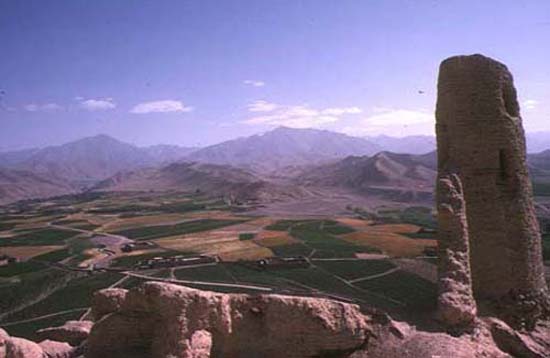2006.03.09: March 9, 2006: Headlines: COS - Morocco: Journalism: COS - Afghanistan: COS - Pakistan: Newsday: James Rupert writes: Battling a resurgent Taliban in Pakistan
Peace Corps Online:
Directory:
Pakistan:
Peace Corps Pakistan :
The Peace Corps in Pakistan:
2006.03.09: March 9, 2006: Headlines: COS - Morocco: Journalism: COS - Afghanistan: COS - Pakistan: Newsday: James Rupert writes: Battling a resurgent Taliban in Pakistan
James Rupert writes: Battling a resurgent Taliban in Pakistan

"The unprecedented scale of the battle, around North Waziristan's main town, Miramshah, reflects a continued, incremental growth of a new Taliban movement in Pakistan, three years after the government deployed much of its army to defeat it." Journalist James Rupert, head of Newsday's international bureau in Islamabad, Pakistan began his career abroad as a Peace Corps volunteer, teaching mechanics and welding in Morocco.
James Rupert writes: Battling a resurgent Taliban in Pakistan
Battling a resurgent Taliban
Pakistan army focuses on holding guerrillas back as neo-Taliban forces gain momentum, resulting in battles of unprecedented scope
BY JAMES RUPERT
STAFF CORRESPONDENT
March 9, 2006
BANNU, Pakistan -- The Pakistani army has been fighting its most intensive battle so far against neo-Taliban guerrillas in the region of North Waziristan. The government is claiming success in the fight, but residents and analysts say the guerrillas have not been defeated.
The unprecedented scale of the battle, around North Waziristan's main town, Miramshah, reflects a continued, incremental growth of a new Taliban movement in Pakistan, three years after the government deployed much of its army to defeat it.
The new evidence of Taliban strength here comes as the Pakistan and Afghanistan governments squabble over blame for the movement's resurgence in fighting on both sides of the border.
Pakistan has barred journalists from North Waziristan, and much about the battle is unclear, including the number of guerrillas involved. The government claims to have killed more than 120 militants so far, while losing five soldiers. But accounts by residents of last week's attacks, and others in recent months, suggest local militants are able to assemble and move hundreds of fighters at a time.
The Miramshah battle began Friday when local guerrillas, angry at an army raid on one of their bases nearby, attacked the town of roughly 50,000 residents, seized government offices and fired on the army base. The army launched a heavy counterattack that included helicopter gunships and regained control of official buildings. Fighting has continued around the town and in other areas of North Waziristan.
The battle was the first of its size in the region and marked the first time the Taliban took direct control, even if briefly, of Miramshah. Still, army spokesman Maj. Gen. Shaukat Sultan told reporters Sunday, "I think we should not get too over-excited about this situation."
He compared the situation with that in South Waziristan, where, he suggested, the army is now back in control after big battles in 2003 and 2004. Residents and journalists from South Waziristan, interviewed in the past 10 days, disagreed.
North and South Waziristan are two of seven tribal "agencies" or districts along the Afghan border that are ruled directly by Pakistan's central government. Four years ago, Taliban guerrillas and other militants from Afghanistan fled into these lands when the Afghan Taliban regime was toppled by the U.S. military and Afghan opposition forces in 2001.
Within a year, a renewed Taliban movement arose and Pakistan sent at least 70,000 troops into the tribal agencies to oppose it. The army fought major battles in South Waziristan and ultimately signed a truce with local Taliban leaders, who run their own administration and retain considerable control of the region, residents say.
Friday night, when the guerrillas attacked Miramshah, "we could hear firing from the mountains, from every direction, with cannons, mortars and rifles," said Sibghatullah, 16, a high school student from a village outside Miramshah.
Fearing the army counterattack, Sibghatullah fled over barren hills the next morning with his extended family of 30, walking nearly half the 30 miles to Bannu, where they and thousands of other refugees from Miramshah are now sheltering.
The family is staying in several rooms belonging to a friend. Sibghatullah sat with more than a dozen relatives in one cramped room yesterday.
The Taliban's influence and its attacks on the army have been growing in the past five months or so and "people are afraid to speak out against them," said a relative of Sibghatullah, who asked that his name not be published.
The other great thing to fear, refugees said, is being anywhere nearby when a Taliban attack takes place. "When they fight, ordinary people and our homes are the ones in danger," Sibghatullah said.
When this story was posted in March 2006, this was on the front page of PCOL:





Peace Corps Online The Independent News Forum serving Returned Peace Corps Volunteers
 | History of the Peace Corps
PCOL is proud to announce that Phase One of the "History of the Peace Corps" is now available online. This installment includes over 5,000 pages of primary source documents from the archives of the Peace Corps including every issue of "Peace Corps News," "Peace Corps Times," "Peace Corps Volunteer," "Action Update," and every annual report of the Peace Corps to Congress since 1961. "Ask Not" is an ongoing project. Read how you can help. |
 | The Peace Corps Library
The Peace Corps Library is now available online with over 40,000 index entries in 500 categories. Looking for a Returned Volunteer? Check our RPCV Directory. New: Sign up to receive PCOL Magazine, our free Monthly Magazine by email. Like to keep up with Peace Corps news as it happens? Sign up to recieve a daily summary of Peace Corps stories from around the world. |
 | Peace Corps suspends program in Bangladesh
Peace Corps Director Gaddi H. Vasquez announced the suspension of the Peace Corps program in Bangladesh on March 15. The safety and security of volunteers is the number one priority of the Peace Corps. Therefore, all Peace Corps volunteers serving in Bangladesh have safely left the country. More than 280 Peace Corps volunteers have served in Bangladesh since the program opened in November 1998. Latest: What other newspapers say. |
 | Invitee re-assigned after inflammatory remarks
The Peace Corps has pulled the invitation to Derek Volkart to join the Morocco Training Program and offered him a position in the Pacific instead after officials read an article in which he stated that his decision to join the Peace Corps was in "response to our current fascist government." RPCV Lew Nash says that "If Derek Volkart spoke his mind as freely in Morocco about the Moroccan monarchy it could cause major problems for himself and other Peace Corps volunteers." Latest: The Ashland Daily Tidings has issued a request for all Peace Corps communications on the case. |
 | Re-envision Peace Corps
Nicholas J. Slabbert says in his article in the Harvard International Review that an imaginatively reinvented Peace Corps could powerfully promote US interests in a period when perceptions of American motives are increasingly relevant to global realignment. His study envisions a new role for the Peace Corps in five linked areas: (1) reinventing America's international profile via a new use of soft power; (2) moving from a war-defined, non-technological, reactive theory of peace to a theory of peace as a normal, proactive component of technologically advanced democracy; (3) reappraising Peace Corps as a national strategic asset whose value remains largely untapped; (4) Peace Corps as a model for the technological reinvention of government agencies for the 21st century; (5) redefining civil society as information technology society. Read the article and leave your comments. |
 | March 1, 1961: Keeping Kennedy's Promise
On March 1, 1961, President John F. Kennedy issues Executive Order #10924, establishing the Peace Corps as a new agency: "Life in the Peace Corps will not be easy. There will be no salary and allowances will be at a level sufficient only to maintain health and meet basic needs. Men and women will be expected to work and live alongside the nationals of the country in which they are stationed--doing the same work, eating the same food, talking the same language. But if the life will not be easy, it will be rich and satisfying. For every young American who participates in the Peace Corps--who works in a foreign land--will know that he or she is sharing in the great common task of bringing to man that decent way of life which is the foundation of freedom and a condition of peace. " |
 | Paid Vacations in the Third World?
Retired diplomat Peter Rice has written a letter to the Wall Street Journal stating that Peace Corps "is really just a U.S. government program for paid vacations in the Third World." Director Vasquez has responded that "the small stipend volunteers receive during their two years of service is more than returned in the understanding fostered in communities throughout the world and here at home." What do RPCVs think? |
 | RPCV admits to abuse while in Peace Corps
Timothy Ronald Obert has pleaded guilty to sexually abusing a minor in Costa Rica while serving there as a Peace Corps volunteer. "The Peace Corps has a zero tolerance policy for misconduct that violates the law or standards of conduct established by the Peace Corps," said Peace Corps Director Gaddi H. Vasquez. Could inadequate screening have been partly to blame? Mr. Obert's resume, which he had submitted to the Peace Corps in support of his application to become a Peace Corps Volunteer, showed that he had repeatedly sought and obtained positions working with underprivileged children. Read what RPCVs have to say about this case. |
 | Why blurring the lines puts PCVs in danger
When the National Call to Service legislation was amended to include Peace Corps in December of 2002, this country had not yet invaded Iraq and was not in prolonged military engagement in the Middle East, as it is now. Read the story of how one volunteer spent three years in captivity from 1976 to 1980 as the hostage of a insurrection group in Colombia in Joanne Marie Roll's op-ed on why this legislation may put soldier/PCVs in the same kind of danger. Latest: Read the ongoing dialog on the subject. |
 | Friends of the Peace Corps 170,000 strong
170,000 is a very special number for the RPCV community - it's the number of Volunteers who have served in the Peace Corps since 1961. It's also a number that is very special to us because March is the first month since our founding in January, 2001 that our readership has exceeded 170,000. And while we know that not everyone who comes to this site is an RPCV, they are all "Friends of the Peace Corps." Thanks everybody for making PCOL your source of news for the Returned Volunteer community. |
Read the stories and leave your comments.

Some postings on Peace Corps Online are provided to the individual members of this group without permission of the copyright owner for the non-profit purposes of criticism, comment, education, scholarship, and research under the "Fair Use" provisions of U.S. Government copyright laws and they may not be distributed further without permission of the copyright owner. Peace Corps Online does not vouch for the accuracy of the content of the postings, which is the sole responsibility of the copyright holder.
Story Source: Newsday
This story has been posted in the following forums: : Headlines; COS - Morocco; Journalism; COS - Afghanistan; COS - Pakistan
PCOL32171
94


















